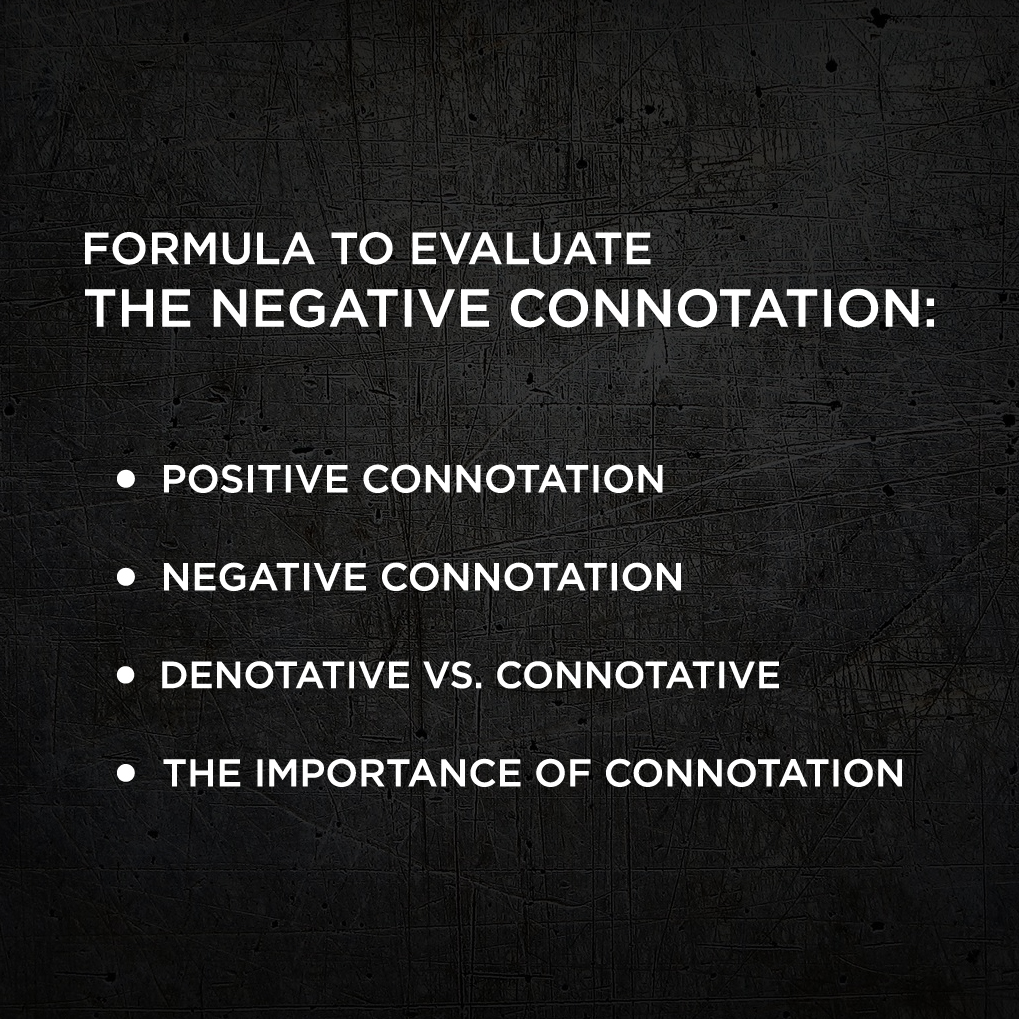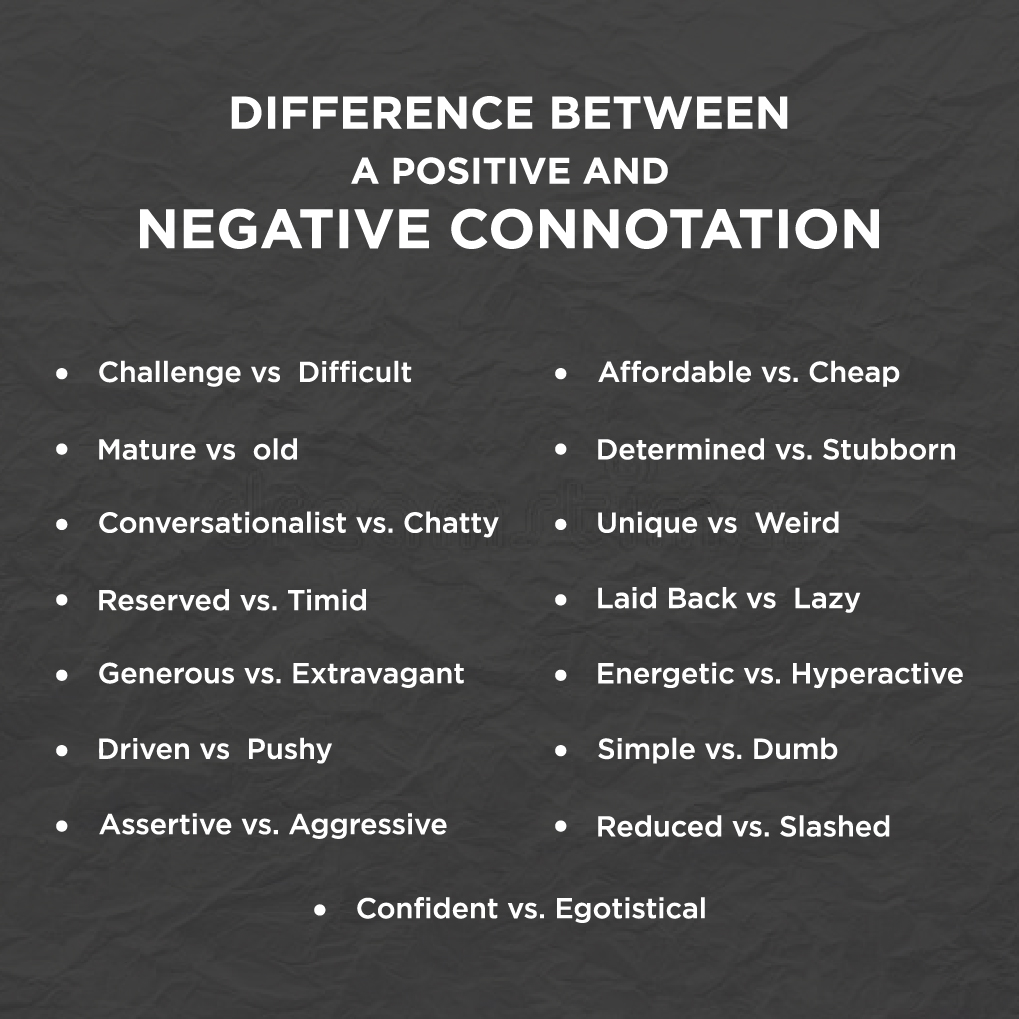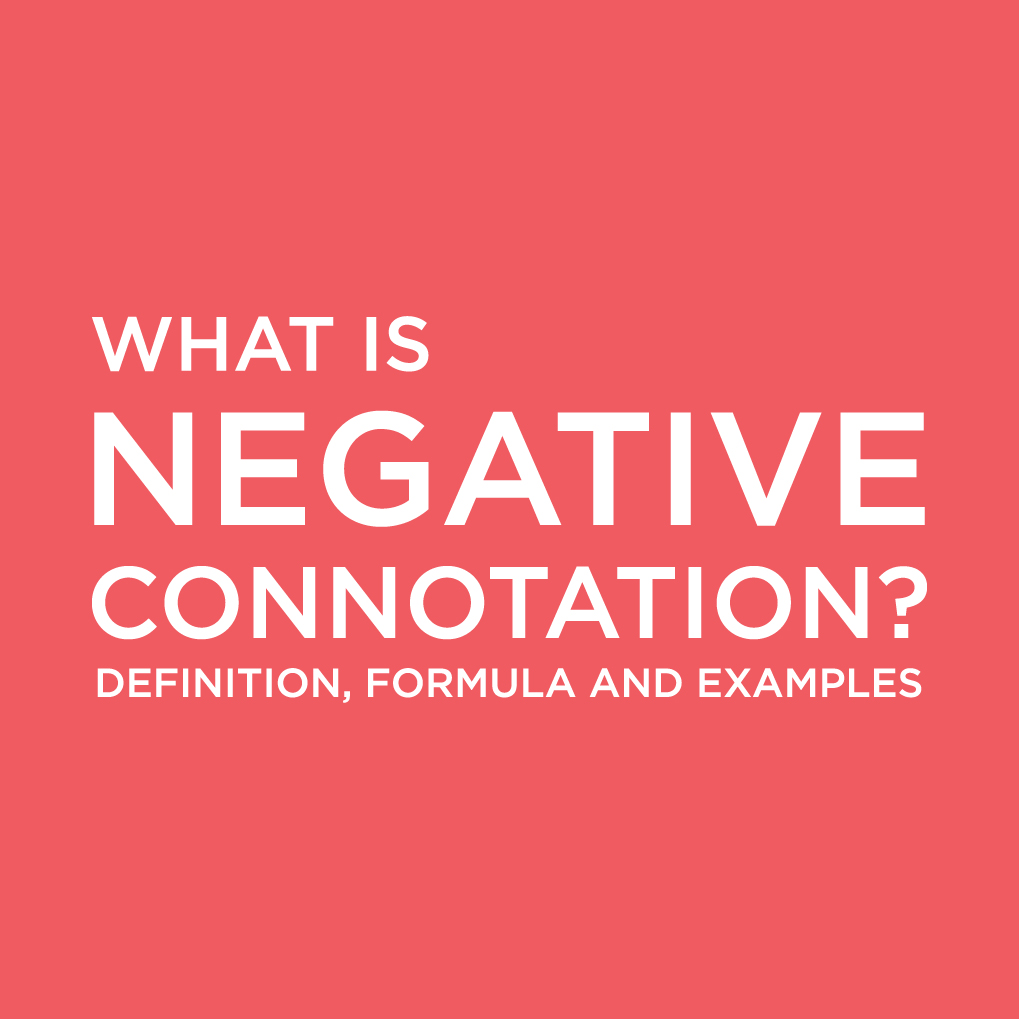Table of Contents
What is a Negative connotation?
A negative connotation is a bad or negative feeling or emotion that people get when they listen or read a particular word or a phrase. While writing, the writer needs to be very careful when selecting words that have negative meanings/connotations to avoid a negative impact on your reader.
The reader gets an emotional side of the written statements what the writer is trying to convey. The writer must clear the context to help the reader understand the actual meaning or the message behind the word. Negative connotation refers to the bad feeling or emotion generated in the reader’s mind after reading a particular word.
What are connotative words?
Connotative words are used to express a feeling using words either negative or positive. The connotation works with both the meaning of the word and the grammar. For example, “John hates to do his homework,” and “John does not like to do his homework.”

Formula to Evaluate the Negative Connotation:
The grammatical formula to find out the positive or negative connotation is quite simple,
Positive Connotation:
Subject + Verb + …..
Negative Connotation:
Subject + Do not + Verb
The two sentences written above can be evaluated by these simple formulas.
Denotative vs. Connotative
Denotation is the standard definition of the word. While Connotation is the feelings associated with it.
The denotative is the official meaning according to the dictionary definition.
The Connotative is the secondary meaning associated with the primary meaning of the word, connotative words denote emotions or feelings.
The Importance of Connotation
The writer should consider both types of meanings (denotative and connotative) when using words in the literature. Choosing words without complete knowledge of meaning could result in the reader’s confusion of getting offended by the wrong understanding.

Difference between a Positive and Negative Connotation
Words are the key to make you feel better or worse. Some words can make you happy; some can make you angry or even cry. The words you choose and connotations play a great role in affecting how you feel and also about the person who is using those words.
I have prepared a long list of words to help you better understand the difference between the positive or negative connotations of the words.
Challenge vs. Difficult
Positive Connotation: The assignment was challenging yesterday.
Negative Connotation: The assignment was very difficult yesterday.
Some people enjoy challenges, they are not necessarily bad, but the word difficult denotes something unpleasant.
Affordable vs. Cheap
Positive Connotation: The shop sells things at a very affordable price.
Negative Connotation: The products are very cheap at that store.
When we use the word “affordable” we mean low prices, but when we use “cheap” it generates two ideas in the mind “low cost” OR “low quality”. The word “cheap” is not a wise choice to tell the price of something.
Mature vs. old
Positive Connotation: My friends are very mature.
Negative Connotation: The friends I have are very old people.
Mature is a positive word that shows a developed character, however, Old sounds like a negative idea of elderly old age people.
Determined vs. Stubborn
Positive Connotation: He is very determined towards his goal of becoming a Lawyer.
Negative Connotation: He is stubborn about becoming a Lawyer.
There is nothing wrong with being determined, but “stubbornness” does not show a positive quality.
Conversationalist vs. Chatty
Positive Connotation: I enjoy talking to him, he is such a conversationalist.
Negative Connotation: Oh my god! He is so chatty.
The difference in the sentences shows clearly shows the meaning and the connotation. The word “conversationalist” shows a person is good in conversation but the word “chatty” means someone is talkative for no reason.
Unique vs. Weird
Positive Connotation: Your color choice is unique.
Negative Connotation: My God! Your color choice is so weird.
The word “unique” shows the interest is different from the rest of the people. On the other hand, the word “Weird” produces a feeling of something “abnormal.”
Reserved vs. Timid
Positive Connotation: His nature is reserved; he does not talk much with new people.
Negative Connotation: He is a timid person, always afraid to meet new people.
“Reserved” is used for people who are generally observers. But, “timid” is used for people who are afraid or scared which shows a negative aspect of someone’s personality.
Laid Back vs. Lazy
Positive Connotation: He is too laid back to complete his homework.
Negative Connotation: He is too lazy to complete his homework.
When you use the word “Lazy” for someone it means you dislike or probably hate that aspect of their personality. But, being laid back is a positive connotation showing a relaxed attitude.
Generous vs. Extravagant
Positive Connotation: Your services towards the society are so generous.
Negative Connotation: Your gift you gave on her birthday was too extravagant.
To compliment on someone’s generosity is a positive act, however, the word “extravagant” shows expenditure far above the need. This word does not mean a positive compliment.
Energetic vs. Hyperactive
Positive Connotation: He is so energetic, he never says “NO” to anything.
Negative Connotation: He is a little hyperactive, he always overdo things.
Being “Energetic” is good quality but being “hyperactive” may seem like a little bit too much.
Driven vs. Pushy
Positive Connotation: Our new colleague is so driven.
Negative Connotation: Our new colleague is so pushy.
The word “Driven” shows ambitious and energetic behavior, while “Pushy” shows someone keeps pushing you instead of motivating you.
Simple vs. Dumb
Positive Connotation: the way of thinking of my friend is so simple.
Negative Connotation: My friend is dumb.
The word “simple” shows the simplicity of someone’s personality and lifestyle, but, being “dumb” is an entirely different thing. It gives a negative idea about someone’s personality.
Assertive vs. Aggressive
Positive Connotation: He has been very assertive and direct; he solves student’s problems with care.
Negative Connotation: He becomes aggressive in every situation.
“Assertive” shows a positive and kind attitude, confidence. However “aggressive” shows a hyper attitude of someone getting angry or handling situations with anger.
Reduced vs. Slashed
Positive Connotation: The workload has been reduced by the management.
Negative Connotation: The workload has been slashed by the management.
To reduce something is a good sign but, to “slash” something produces a negative psychological effect. It means to cut off something.
Confident vs. Egotistical
Positive Connotation: He is confident enough to talk to anyone anytime.
Negative Connotation: He is egotistical to talk to people.
Determined, assertive, and confident all of the words shows the same personality traits. However, being egotistical is used to show a bad attitude.
Concluding Words:
The listener or the reader is always the first priority. The meaning and the context is the most important thing to keep in mind when saying or writing. The negative connotation of a word can turn a positive message into a negative one just because you used an inappropriate word with inappropriate meaning. There are thousands of examples of connotation in literature. With more than 10 examples the importance of connotation and denotation should be clear. If not used properly the negative connotation can ruin entire positive message. The best way to learn how to use connotation is to practice it in actual sentences. It is very useful learn how to use synonyms, and these strategies are best to select the denotative or connotative words for your purpose.

